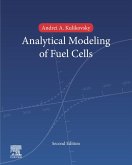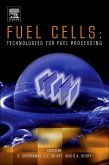In fuel cell research, the gap between fundamental electrochemical processes and the engineering of fuel cell systems is bridged by the physical modelling of fuel cells. This relatively new discipline aims to understand the basic transport and kinetic phenomena in a real cell and stack environment, paving the way for improved design and performance. The author brings his unique approach to the analytical modeling of fuel cells to this essential reference for energy technologists.
- Covers recent advances and analytical solutions to a range of problems faced by energy technologists, from catalyst layer performance to thermal stability
- Provides detailed graphs, charts and other tools (glossary, index) to maximize R&D output while minimizing costs and time spent on dead-end research
- Presents Kulikovsky's signature approach (and the data to support it)-which uses "simplified" models based on idealized systems, basic geometries, and minimal assumptions-enabling qualitative understanding of the causes and effects of phenomena
Dieser Download kann aus rechtlichen Gründen nur mit Rechnungsadresse in A, B, BG, CY, CZ, D, DK, EW, E, FIN, F, GR, HR, H, IRL, I, LT, L, LR, M, NL, PL, P, R, S, SLO, SK ausgeliefert werden.
"This is a well-written introduction to the modeling of fuel cells that the reader will no doubt want to supplement by referring to published research articles (a comprehensive bibliography is included). It is written by a physicist, but is clearly influenced by engineering rather than science.It uses 'simplified' models based on idealized systems, basic geometries and minimal assumptions, enabling the qualitative understanding of the causes and effects of the system phenomena. In this way it shows how analytical modeling can be applied to real fuel cell systems." -- Energy News









